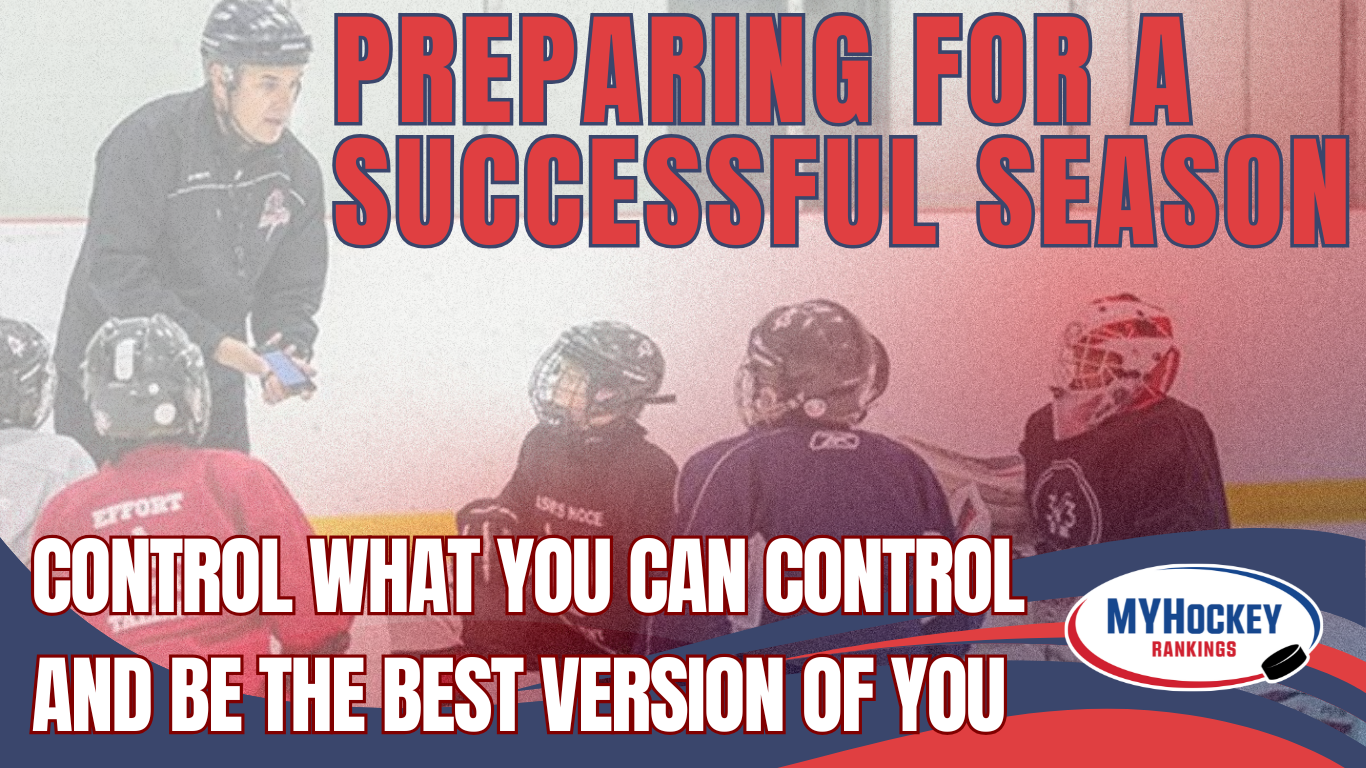
Preparing for a Successful Season: Control What You Can Control & Focus on Being the Best Version of You
By Scott Lowe – MYHockeyRankings.com
The more years I’m involved with youth hockey, the more it amazes me how many people seem more concerned about everyone and everything else instead of just focusing on being the best they can be every day and doing whatever it takes to improve.
Whether it’s players or parents, there seems to be an obsession with what someone else is getting or how others are being treated. And most times, instead of listening to coaches or advice from people who are trying to help, these players and parents just throw up their hands and play the victims.
It's always someone else’s fault.
Whether it’s the “stupid coach,” the “dumb scouts,” the “idiot hockey director,”, the “moronic general manager” or even the “terrible referees,” passing the blame on to others instead of looking in the mirror and being accountable seems to be the norm in youth hockey these days. It’s likely that this is a problem in everyday life, too, but there’s no doubt that it’s prevalent among young hockey players and their families.
That is no way to be successful, whether we are talking about hockey or life.
While FOMO – the fear of missing out – seems to have progressed from being a phenomenon among kids to a societal norm, worrying about everyone else instead of ourselves can lead to a pattern of behavior that both prevents us from reaching our potential and sends us into a downward spiral of unhappiness and frustration that can be hard to escape.
The calendar tells us that we are about a month away, give or take a week or two, from the start of the 2025-26 youth hockey reason for most young players in North America. Whether we are talking about training camp, preseason practice or early season tournaments, many teams will be back on the ice regularly in the next four to six weeks.
For older, more serious players looking to step up to a new level, make a team and continue their journey toward what they hope will be successful junior and college careers, now is the time to ramp up the training in hopes of being in peak condition when the puck drops for real. For younger and less-serious players who still want to make the most of their seasons, the next few weeks also present an opportunity to get back on the ice and start preparing their bodies for the long road that lies ahead.
Either way, if the goal is to have the best season possible, the focus from this point should be on controlling what you can control and being the best version of yourself that you can. Period.
Players are selected to be on a team for a reason and are expected to fill the role assigned to them by their coach. Beginning the year with the mindset of trying to fulfill that responsibility to the best of their ability and approaching their preparation with that goal in mind during the weeks leading up to the season will allow them to hit the ice running, so to speak, and make a positive first impression on the coach right from Day 1.
The time for skill development, trying new things and working on deficiencies, for the time being, has passed. Players can get back to that once the season is underway and they have settled into their weekly routine.
For now, the focus should be on controlling the controllables and being as prepared as possible to fulfill their assigned role as best they can right from the start of preseason practice or training camp. Worrying about who is on the first line and who is on the power play – and trying to cram work on aspects of their games that they need to improve to get those opportunities – most likely isn’t going to get them there in a few short weeks.
Hopefully, players who are serious about improving and moving up the lineup spent time on those aspects of their game earlier in the spring and summer. Either way, now is the time to prepare physically and mentally for the role that has been assigned.
Control what you can control and be the best YOU that YOU can be.
Players who enter the season with that mindset and maintain it throughout the season are going to maximize their odds of having a successful year and moving up the lineup. Those who already find themselves at the top of the pyramid can ensure that they maintain that position and continue their progression toward playing at higher levels in the future with a similar approach.
Likewise, if most of the players on a team enter the season with that type of mindset, it’s much more likely that the group will be successful. Playing on a team that has everyone pulling the rope in the same direction and improving throughout the year is a lot more fun than being a part of one that is dysfunctional and doesn’t function as a cohesive unit.
If it’s fun to come to the rink every day, everyone shows up ready to work or play and with more energy and enthusiasm. Coming to the rink in a positive frame of mind and skating with and against teammates who bring the energy, work ethic and compete level daily usually makes everyone better over the course of the season.
See how all this works?
From an individual perspective, moving up the lineup can be as much a function of earning the coach’s trust as it is coming to preseason camp with a new bag of tricks. Remember, the coach may not be looking for a particular player to toe drag through the defense for a spectacular goal. He or she may be looking for that player to bring energy, forecheck hard, play a solid 200-foot game, win battles and block shots. Every team needs players who possess those qualities to be successful.
It's not likely that a player slated for that role will change a coach’s mind on the first day of practice no matter how much flash is shown, but doing everything that is asked over a period of weeks or months and striving to fulfill that assigned role in every practice and game can build a level of trust among the coaches that ultimately might lead to increased opportunities.
No trust probably means no new opportunities, and the process of preparing to fulfill the assigned role and building trust with the coaching staff begins right now on and off the ice.
On the ice it means spending the next few weeks focusing on having the body prepared to play a high-energy game, building stamina and working on small details such as winning faceoffs and puck battles. Off the ice it requires accepting the situation mentally and committing 100 percent to bringing the proper approach to the rink every day.
Showing up to the first day of practice in shape and ready to play the right way will make an immediate impression and show the coaches that the player is serious about doing whatever is necessary to help the team succeed. Trust isn’t earned in a day, but it can deteriorate rapidly if the first impression is negative.
The trust-building process shouldn’t begin with the first practice, however. It’s imperative for players to communicate regularly and build a relationship with their coaches. Building and fostering a relationship with the coaching staff is an ongoing process that should continue throughout the season.
Players shouldn’t wait for the first practice to begin that process, though, because there’s no way that any player can fully understand and strive to fulfill a coach’s expectations without a conversation between the time that the team is chosen and that first team skate.
It’s safe to say that many young players speak to their coach during or immediately after tryouts and read whatever emails or text messages they receive leading up to the season without engaging in any real meaningful dialogue. A simple reply to an email or text message or a conversation in which some meaningful questions can be presented and answered can jumpstart the relationship-building process and help a player gain an advantage over other players heading into the season.
The only way to fully understand what a coach expects of a player is to have a conversation about it. Without that understanding, a player may go into the season blindly trying to win the approval of the coach or playing a style that the coach won’t be happy with instead of knowing exactly what role the coach wants the player to fill. If the coach and player aren’t on the same page entering the season and get off to a rocky start, approaching the coach later can be much more daunting.
Players should ask their coaches why they made the team, what role the coach sees them filling, what areas of their game need improvement and what areas are strengths. They also should find out what style of play the coach expects from them.
The answers to those questions should provide the blueprint for what areas should be the focus leading up to the season and once practice begins. Players don’t want to show up to practice planning to play a style that the coach has no interest in seeing from them or that might ultimately get them demoted.
That spring or summer conversation can show a coach that the player is committed to being coachable, sacrificing individual performance for the good of the team and doing whatever it takes to help the team win. And just like that, another piece is added to the trust puzzle.
If this blueprint is followed, after one practice the player will have laid the foundation for building a positive relationship with the coach, shown up in shape and ready to take on the role the coach has assigned and proven on and off the ice a willingness to do what’s best for the team.
Now compare this player to one who has just done the bare minimum on all fronts. Which player is better prepared and more likely to have a successful season?
At the end of the day, whether a player loves the coach, hates the coach, agrees with the coach or simply tolerates the coach, it’s his or her team and the only thing that matters is making that person happy. The coach is going to dictate which players get which opportunities while also playing a large role in opening doors for opportunities the player receives in hockey going forward. Nothing goes farther than a ringing endorsement from a coach for players who are looking to advance to higher levels.
Hockey is a fluid sport, both during games and over the course of a long and grueling season. There are injuries. Players underperform and fall in and out of favor. Personality conflicts arise.
During times of crisis, coaches naturally turn to players they trust first. Trusted players who perform well when presented with opportunities stand a much better chance of receiving more similar opportunities in the future and possibly even permanently moving into larger roles.
Instead of staying focused on the task at hand and striving to fulfill their assigned role on the team, too many players compare themselves to others who are receiving the opportunities they crave.
“If I played on the first line with those two guys I’d put up a lot more points,” is a statement I hear often from disgruntled players. Sure. Almost anyone would be more productive playing with more talented linemates. And many times, players who are lower in the lineup get moved into bigger roles because of an injury and might even score a few points only to be returned to their original spot when the injured player comes back.
This only increases their frustration as they can only see the points they scored while skating with better linemates and nothing else. They don’t consider that maybe they just reaped the benefits of playing alongside more talented players and didn’t do anything to make those players better.
Perhaps because of attitude, effort or body language before the opportunity was presented, the player hadn’t earned the trust of the coach. Maybe the coach wasn’t convinced that the player was willing to do whatever it takes for the good of the team, so instead of seeing the player as potential permanent replacement the coach just wanted to find a way to survive for a game or two.
Conversely, players who have earned the trust of the coach and who bring their consistent, team-first attitude and high-energy style to any opportunity they are presented with may find themselves in a new permanent role if they, their new line and the team are successful. The injured player may have to work to return to that original spot in the lineup by, you guessed it, earning the trust of the coach by graciously accepting a new role and doing what’s best for the team.
Preparation. Attitude. Effort. Energy. Compete level. Work ethic. Selflessness. Building the player-coach relationship.
These are all things young players can control.
Seeking to understand and then appreciating how their coaches view and value them – as well as what is expected from them as a member of the team – and striving to be the best version of the player the coaches selected for the team every day without worrying about how others are performing or being treated is a conscious choice. Players are in full control of the choices they make.
The players most likely to have successful seasons – success is not always determined by the number of goals, assists and points that are scored – are the ones who embrace their situation and are determined to make the most out of it.
They are the ones who control what they can control and focus their time and energy on being the best versions of themselves they possibly can.
Control what you can control and be the best YOU that YOU can be.
The rest should take care of itself.

